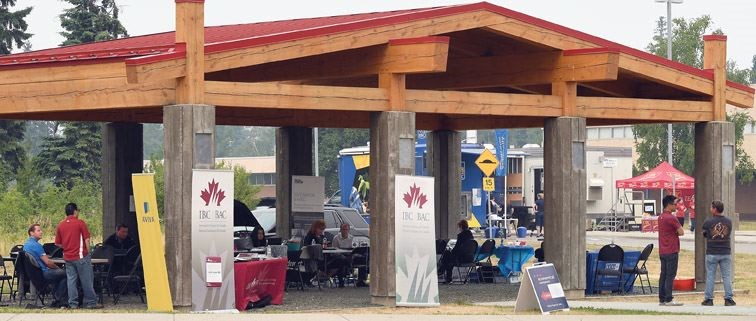Think of first responders and fire fighters, police and paramedics come to most people's mind.
But in the event of a major catastrophe like the abundance of wildfires that have struck the province and you can add representatives from insurance companies to the list.
Almost as soon as evacuees began to converge on the city, teams from at least a half-dozen insurers arrived in Prince George to help out their clients.
They've set up in local hotels and other spots and, under the auspices of the Insurance Bureau of Canada, have gathered at Prince George Secondary School to act as a one-stop shop for clients.
"We're not a first responder in the sense that we're a fire department but we really add a lot of value right at the beginning when something like this happens," Intact spokeswoman Rosa Nelson said.
Perhaps the biggest benefit initially is to get money right away for living expenses for those who have mass evacuation under their policy.
"That money can help you with where you have to live, it can help you with food, it can help you with clothing," Nelson said. "If you have to move really, really quickly, you may not have the opportunity to take any of those things."
Some 1 1/2 weeks after disaster first struck, they're still getting a steady stream of clients. On Tuesday, well over 100 had passed through the group location at PGSS, according to the Insurance Bureau of Canada's Pete Karageorgos, who arrived from Toronto to help coordinate the effort.
He said a common oversight for evacuees is forgetting to take their insurance policies with them but with a bit of work, representatives are often able to get them in touch with their insurers and figure out what coverage they have.
Although much of the work can be done over the phone or via the internet, getting people on the ground can make the process smoother for both the clients and the companies.
"When you're on the phone and you have someone talking to you, that can be overwhelming, whereas when you're in-person sitting there, you can give the person a few minutes to absorb the information, they can ask some questions," Nelson said. "Even if they have to walk away for 10 minutes and come back, we're still there."
Events like the Fort McMurray forest fire, the Calgary flood and the Quebec ice storm are have become common enough for companies to have teams dedicated year-round to helping clients with the fall out from catastrophes. They put in 10-12-hour days while on the road so the offices can continue to serve the regular customers they get each day.
"Ten years ago, we didn't really talk about catastrophes but now they're absolutely a part of our business," Nelson said. "We just know we have to be there and we have to respond."
Helping out evacuees with basic needs is only half the job. Assessing the damage once the fires have been brought under control and the evacuation orders lifted will be the next task.
"We haven't heard of a lot of home losses, which is good news," Nelson said. "But still, there will be some smoke damage, there will be some fridge and freezer claims, ash damage, things like that."
All that aside, there is the stress. Insurers may even be able to help on that front. Nelson urges evacuees to see if their policies include coverage for psychological counseling.
"I'm sure a lot of people don't even know they have this within their policies," Nelson said.
Two banks - CIBC and RBC - have also set up mobile branches at PGSS. For evacuees, they're deferring payments on credit cards and loans, reversing fees for overdrafts and use of non-bank ATMs and giving breaks on mortgages.
The branches are also offering such perks as free WiFi, chargers for smartphones, T-shirts and toys to help parents keep their kids occupied.
RBC's mobile branch was heading to Atlantic Canada when word got out of the trouble in the Central Interior. It was turned around and driven to Prince George, RBC spokesman Ian Colvin said.

.png;w=120;h=80;mode=crop)

